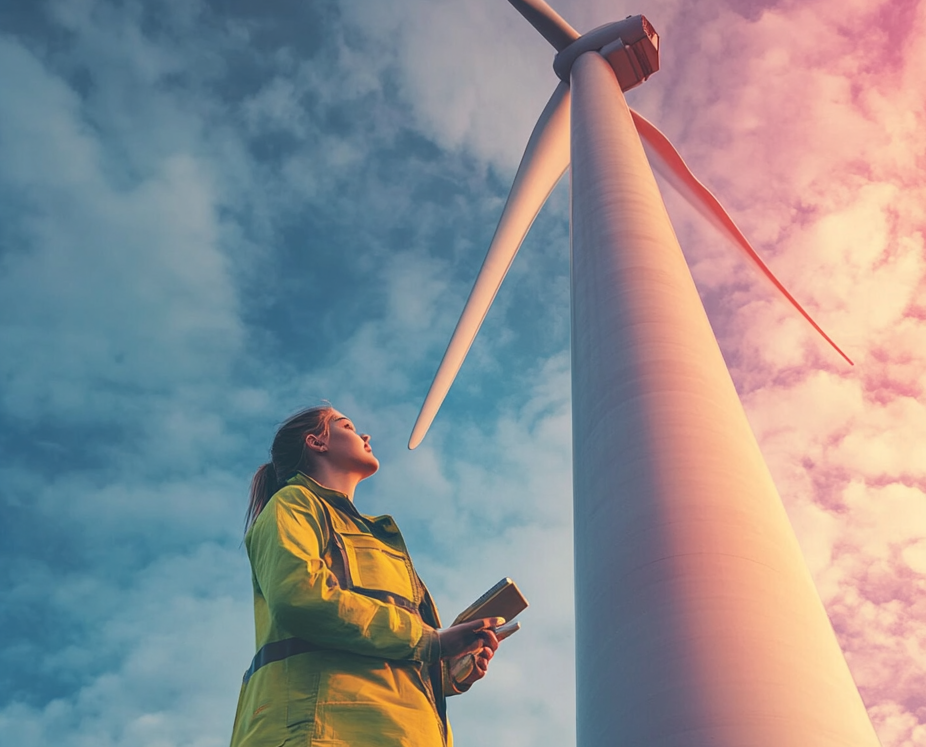The offshore wind industry is a critical player in the transition to renewable energy, with ambitious targets, such as increasing female representation to 33% by 2030. However, as more women join the sector, there remains a significant, often-overlooked issue—a lack of adequate offshore wind toilets and welfare units.
The Reality of Offshore Wind: Sanitation & Hidden Struggles of Workers
A study by Dr. Jade Stalker & Dr. Marijana Baric (2022) at the University of East Anglia (Clearing the Pathway for Women in Wind) sheds light on the sanitary challenges faced by women offshore. These include:
- No dedicated toilet facilities on turbines, forcing workers to hold it in for 12-hour shifts.
- Travelling back to vessels to use the toilet, leading to lost work time and safety concerns.
- Lack of sanitary waste disposal options, meaning women must carry used products with them until they return to shore.
- Male-oriented sanitation practices, where men can discreetly relieve themselves, but women must make special arrangements or none at all and risk their health.
One offshore technician from the 2022 study shared her experience:
“One of the girls doesn’t go to the toilet at all on the turbine. Sometimes, we’re working 12-hour shifts in hot conditions, and she won’t drink just to avoid needing the bathroom. That’s absolutely crazy to me.”
Another technician revealed:
“On turbines, there’s no toilet. If you need to go, you have to call the boat, take all your gear off, climb down, get on, use the toilet, put everything back on, and climb back up. Nobody does it.”
Offshore Wind Toilets: A Simple Yet Essential Solution
Despite technological advancements in offshore wind, basic human welfare is still being overlooked. The industry must prioritise offshore wind toilets as standard infrastructure on all turbines. Practical solutions can include:
- Dedicated offshore wind welfare units equipped with proper sanitation facilities and waste management.
- Proper disposal methods for sanitary waste, ensuring dignity and hygiene.
A technician from the 2022 study highlighted the current solutions, stating:
“We created a solution—what we call a pop-up toilet. It’s a camping toilet with an external tent. It works, but it still has a dignity issue. Everyone knows what it is, and most women prefer to wait until they’re back on the vessel.”
Pop-up tent toilets, waste bags, and containers are no longer acceptable in 2025. If this standard isn’t tolerated on land, why should it be offshore?
Why Toilets Are Essential for Offshore Wind Workers’ Health & Safety
While much of the discussion around offshore toilets has focused on improving conditions for women, toilets benefit men, too. This is not just about gender but basic health, safety, dignity, and respect for all workers.
Serious medical conditions that can affect health if no toilets are available include:
- Irritable Bowel Syndrome (IBS) – Affects 1 in 7 people, leading to unpredictable and urgent toilet needs.
- Inflammatory Bowel Disease (IBD) – including Crohn’s Disease and Ulcerative Colitis- affects 1 in 123 people in the UK.
- Benign Prostatic Hyperplasia (BPH) – experienced by 1 in 2 men over 50, causing frequent urination and difficulty holding it in.
Without proper toilet facilities, offshore workers with these conditions can face unnecessary suffering, embarrassment and even potential medical complications. It is a fundamental health and safety issue, not just a convenience.
Offshore Wind Welfare: Why the Industry Must Take Responsibility
The offshore wind sector must move beyond makeshift solutions. While innovation has revolutionised turbine technology, workforce welfare lags behind badly. Without access to proper offshore wind toilets and welfare units, many technicians —regardless of gender—will continue to face unnecessary hardship, limiting diversity and retention in the industry.
At Harlum Services, we are committed to changing this. Our offshore wind toilet solution provides a simple, effective fix to an industry-wide problem—ensuring workers don’t have to compromise dignity, hydration, or safety while on the job.
Let’s Talk About Offshore Wind Welfare Units
The conversation around offshore wind welfare units needs to evolve. These facilities should not be an afterthought. Investment in welfare is not a luxury—it’s necessary for equality, safety, and retention in the industry.
It’s time to prioritise real solutions because offshore workers, regardless of gender or medical condition, deserve basic dignity.
References
- Stalker, J., & Baric, M. (2022). Clearing the Pathway for Women in Wind. University of East Anglia.
- Guts UK. (n.d.). Irritable Bowel Syndrome (IBS). Retrieved from https://gutscharity.org.uk/advice-and-information/conditions/irritable-bowel-syndrome/.
- Crohn’s & Colitis UK. (2023). New research shows over 1 in 123 people in the UK living with Crohn’s or Colitis. Retrieved from https://crohnsandcolitis.org.uk/news-stories/news-items/new-research-shows-over-1-in-123-people-in-uk-living-with-crohn-s-or-colitis.
- Yale Medicine. (n.d.). Benign Prostatic Hyperplasia (BPH). Retrieved from https://www.yalemedicine.org/conditions/enlarged-prostate-benign-prostatic-hyperplasia-bph.
